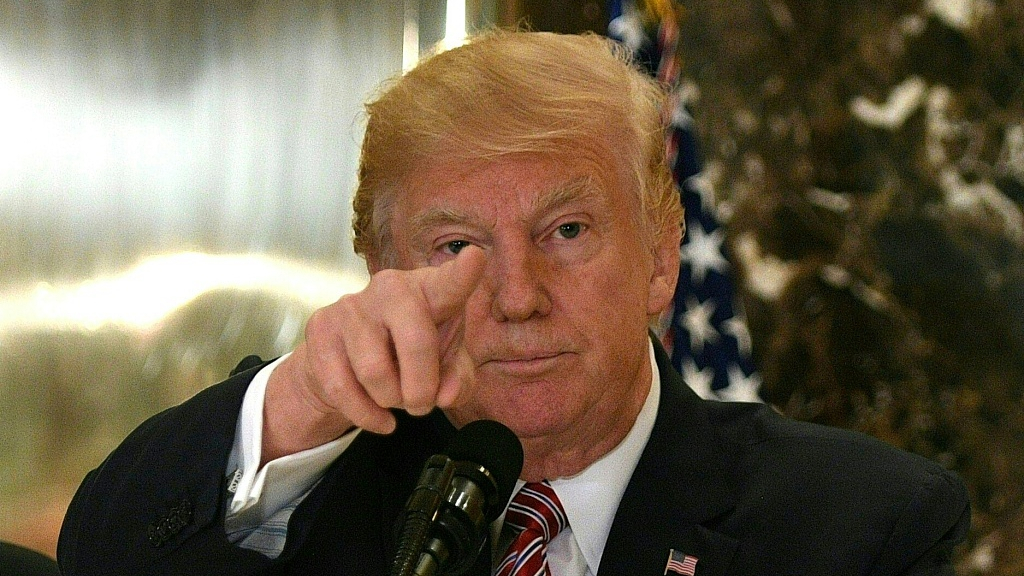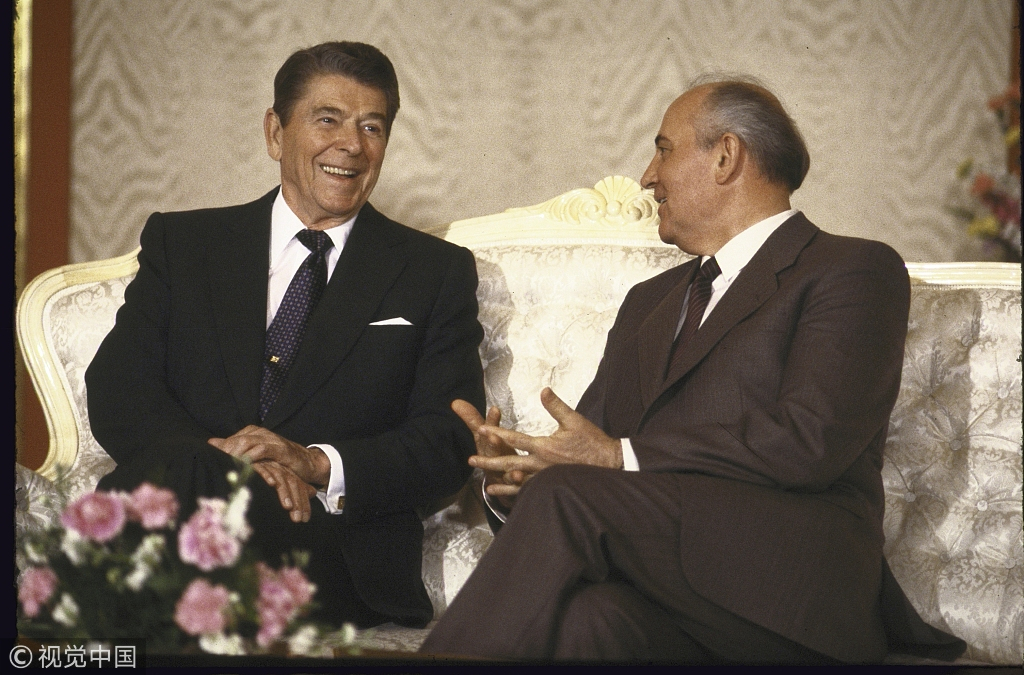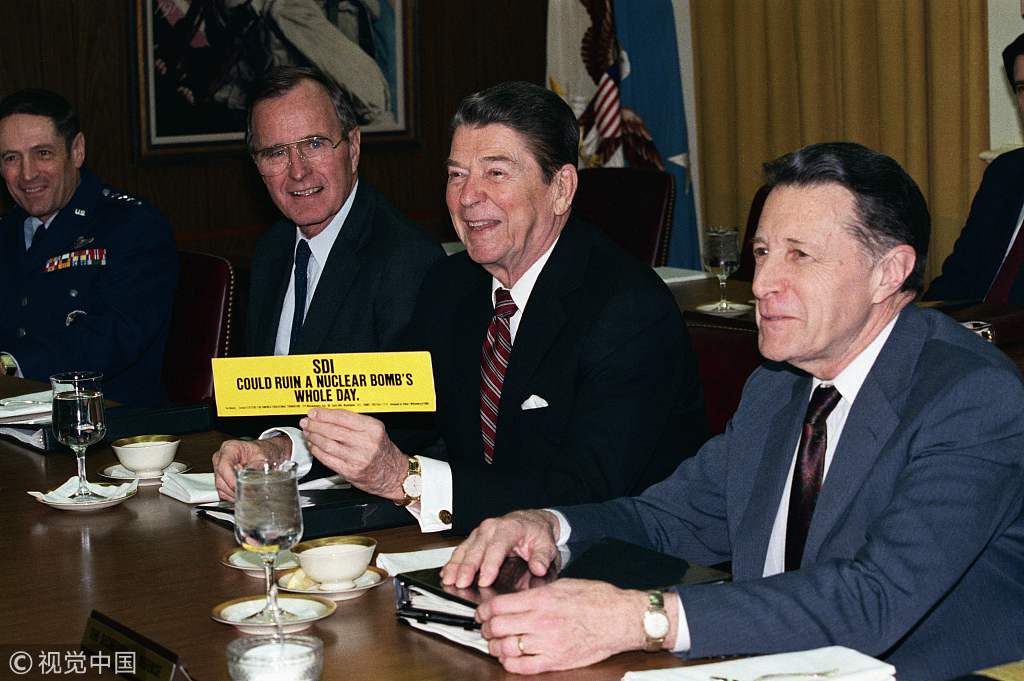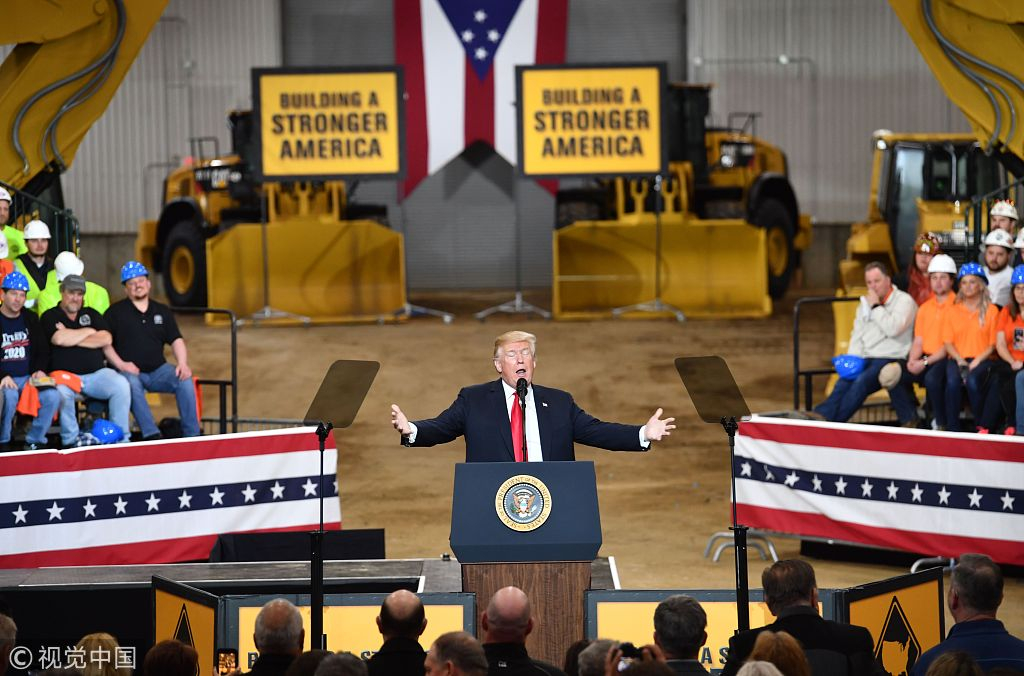
Opinion
12:27, 08-Apr-2019
World hopes Trump turns a new leaf
Updated
13:43, 08-Apr-2019
Ken Moak

Editor's Note: Ken Moak, who taught economic theory, public policy and globalization at the university level for 33 years, co-authored a book titled "China's Economic Rise and Its Global Impact" in 2015. The article reflects the author's opinion, and not necessarily the views of CGTN.
It is too early to tell whether U.S. President Donald Trump is turning over a new leaf and becoming like former President Ronald Reagan. His unexpected pronouncement of proposing to his Chinese and Russian counterparts to reduce future spending on nuclear weapons production during a meeting with the Chinese trade negotiations delegation on April 4 was a pleasant surprise.
This is a remarkable U-turn considering he is the same man who announced an over 1 trillion U.S. dollar plan to upgrade the nuclear arsenal over the next 30 years and weaponize space, withdrew from the Intermediate Nuclear Forces Treaty (INF), and proposed defense budgets exceeding 700 billion U.S. dollars in each of 2019 and 2020.
Moreover, he mounted trade wars with foes and allies alike, imposing tariffs on Canadian steel and aluminum and over 250 billion U.S. dollars of Chinese imports which in large part contributing to an economic slowdown.
Under Trump, freedom of navigation operations in the South China Sea and Taiwan Straits have become more frequent and provocative. His latest adventurism is calling for regime change in Venezuela.
Trump's U-turn and the reasons behind it look remarkably similar to those of former President Ronald Reagan during the Cold War.

Former U.S. President Ronald Reagan (L) chat with then Soviet leader Mikhail Gorbachev at the Kremlin in Moscow, Russia, 1988. /VCG Photo
Former U.S. President Ronald Reagan (L) chat with then Soviet leader Mikhail Gorbachev at the Kremlin in Moscow, Russia, 1988. /VCG Photo
Comparison between Trump and Reagan
The late President Ronald Reagan won the 1981 presidential election on the promise of making America strong and respected again. Like Trump accusing Barack Obama of not protecting U.S. interests enough, Reagan campaigned on incumbent President Jimmy Carter of being weak in handling the Iranian hostage crisis and dealing with the Soviet Union.
Both men got elected to the U.S. presidency on the "Make America Great Again" rhetoric. Reagan did not use the term, but his campaign was the same.
Reagan was fiercely anti-communist, calling the Soviet Union an evil empire and accused China of stifling human rights. He challenged then Soviet President Mikhail Gorbachev to bring down the Berlin Wall which separated West and East Germany. Reagan, too, was said to have toyed with the idea of upgrading relations with Taiwan.
In 1983, Reagan announced his "Strategic Defense Initiative" (SDI) or "Star Wars," a defense policy calling for the building of a series of air-land-sea-based missile systems to shoot down incoming Soviet or other countries' missiles.
However, he made a U-turn two years later, proposing the destruction of all nuclear weapons, perhaps realizing that a nuclear war with the Soviet Union could lead to mutually assured destruction.
Another motive might be the rising national debt caused by massive defense spending and tax cuts.

Reagan shows support for the Strategic Defense Initiative, 1987. /VCG Photo
Reagan shows support for the Strategic Defense Initiative, 1987. /VCG Photo
The world was glad that he did, preventing the Cold War from turning hot. For example, Reagan negotiated and signed the Intermediate- and Short-Range Nuclear Forces Treaty (INF) to eliminate the missiles with Soviet President Gorbachev in 1987.
He was also said to have proposed reduction of strategic offensive arms such as intercontinental ballistic missiles, culminating in the signing of the Strategic Arms Reduction Treaty (START) between George H.W. Bush and Gorbachev in 1991. It could, therefore, be argued that Reagan did make the world a lot safer.
Trump seems to have the same issues as Reagan's: mounting debt and unthinkable war with China and Russia.
Trump's massive tax cuts of approximately 1.5 trillion U.S. dollars and huge increases in defense spending pushed the government-debt-to-GDP ratio to 105 percent in 2018, according to the U.S. Bureau of National Statistics.
This debt level is way above the World Bank tipping point of 77 percent, above which the national debt might not be repaid. That would downgrade the U.S.' credit rating, leading to an interest rate increase and worsening the already downward economic spiral.
Further, a war with China and Russia is even more unthinkable than during the Reagan years (1981 – 1989), the height of the Cold War. The combined military strength of two antagonists might be just as if not more lethal than that of the United States.
It makes economic and geopolitical sense for Trump to ban further nuclear weapons production. In doing so, Trump might have a better chance of getting re-elected and a deal with China to end the trade war.

U.S. President Donald Trump speaks on infrastructure development at the Richfield Training Site, Ohio, the U.S., March 29, 2018. /VCG Photo
U.S. President Donald Trump speaks on infrastructure development at the Richfield Training Site, Ohio, the U.S., March 29, 2018. /VCG Photo
The economics of ending nuclear arms production
Trump himself said the U.S. needs 1.5 trillion U.S. dollars to repair and upgrade the country's roads, bridges, airports, and other infrastructures. The huge sum of money would create enormous economic activities and job opportunities.
For example, building or repairing bridges increases the demand for steel, concrete and other related materials and stimulates the resource industries, creating employment in all sectors. Additional employment would increase consumption which in turn spurs investment. The spillover effect is indeed massive for the United States.
China and Russia should be receptive to the proposal. The rest of world, too, will likely rejoice at Trump's proposition of creating a safer place to live and work. Not having to choose sides would allow friends and foes of the U.S., China, and Russia to direct their attention and resources on economic growth or recovery.
The world hopes Trump will be Reagan II
Ronald Reagan played an important role in preventing nuclear holocaust. He also sought rapprochement with China of some sort.
Whether Trump could turn his words into policies like Reagan is unclear because of his hawkish officials and the U.S. Congress, but the world hopes he would. In doing so, Trump would not only realize his "Make America Great Again" policy but make the world a better place.
Rapprochement with China and Russia and focus on economics rather than on national defense does promote and sustain long-term economic growth and geopolitical stability.
(If you want to contribute and have specific expertise, please contact us at opinions@cgtn.com.)

SITEMAP
Copyright © 2018 CGTN. Beijing ICP prepared NO.16065310-3
Copyright © 2018 CGTN. Beijing ICP prepared NO.16065310-3